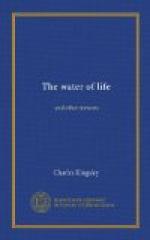’That one far-off divine event
Towards which the whole creation moves;’
that wonder of which prophets and apostles have told, each according to his light; that wonder which Habakkuk saw afar off, and foretold how that the earth should be filled with the knowledge of the Lord, as the waters cover the sea; that wonder which Isaiah saw afar off, and sang how the Lord should judge among the nations, and rebuke among many people; and they should beat their swords into plough-shares, and their spears into pruning-hooks; nation should not rise against nation, neither should they learn war any more; that wonder of which St Paul prophesied, and said that Christ should reign till He had put all His enemies under His feet; that wonder of which St. John prophesied; and said, ’I saw the Holy City, new Jerusalem, coming down from God out of heaven. And the nations of them that are saved shall walk in the light of it, and the kings of the earth bring their glory and their honour unto it;’ that wonder, finally, which our Lord Himself bade us pray for, as for our daily bread, and say, ’Father, thy kingdom come; thy will be done on earth, as it is in heaven.
‘Thy will be done on earth.’ He who bade us ask that boon for generations yet unborn, was very God of very God. Do you think that He would have bidden us ask a blessing, which He knew would never come?
SERMON XIV. THE GREAT COMMANDMENT
Matt. xxii. 37, 32.
Thou shalt love the Lord thy God with all thy heart, and with all thy soul, and with all thy mind. This is the first and great commandment.
Some say, when they hear this,—It is a hard saying. Who can bear it? Who can expect us to do as much as that? If we are asked to be respectable and sober, to live and let live, not to harm our neighbours wilfully or spitefully, and to come to church tolerably regularly—we understand being asked to do that—it is fair. But to love the Lord our God with all our hearts. That must be meant only for very great saints; for a few exceedingly devout people here and there. And devout people have been too apt to say,—You are right. It is we who are to love God with all our hearts and souls, and give up the world, and marriage, and all the joys of life, and turn priests, monks, and nuns, while you need only be tolerably respectable, and attend to your religious duties from time to time, while we will pray for you. But, my friends, if we read our Bibles, we cannot allow that. ‘Thou shalt love the Lord thy God,’ was spoken not to monks and nuns (for there were none in those days), not to great saints only (for we read of none just then), not even to priests and clergymen only. It was said to all the Jews, high and low, free and slave, soldier and labourer, alike—’Thou, a man living in the world, and doing work in the world, with wife and family, farm and cattle, horse to ride, and weapon to wear—thou shalt love the Lord thy God.’




